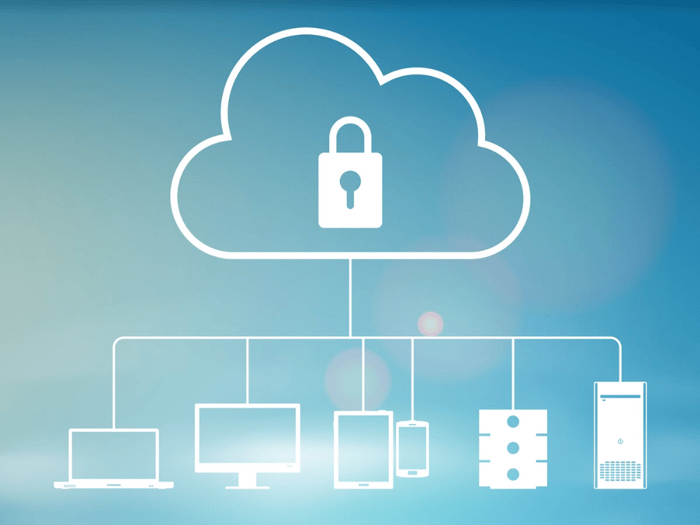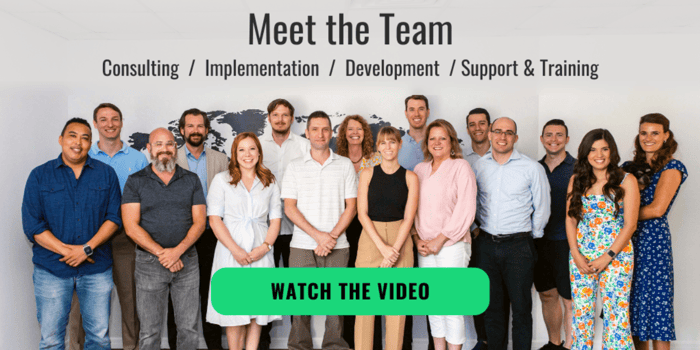As a business grows, it often outgrows the basic software it started with and needs to move up to an Enterprise Resource Planning (ERP) system. However, with so many different ERP options available, choosing the right one for your company can be difficult. This guide will help you make the best decision for your specific business.
What is an ERP?
An ERP system is a software solution that helps businesses manage their core operations, such as accounting, human resources, and inventory management. ERP systems streamline business processes and improve efficiencies by integrating all of a company's essential data into one centralized system.
Organizations across industries use ERPs. Many small businesses implement ERP solutions to gain visibility into their operations and better compete with larger organizations. Midsize companies often turn to ERP to support growth or international expansion. Large enterprises typically use ERP to drive digital transformation initiatives or support complex supply chains.
While all ERP systems share standard features and functionality, several different types of ERP solutions are on the market. Some of the most popular ERP software solutions include SAP, Oracle (multiple products, including NetSuite, Microsoft Dynamics, and Infor.
Why Do You Need an ERP?
As your business grows, you'll quickly discover that relying on ad hoc processes, manual data entry, and scattered information leads to inefficiencies, errors, and frustrated employees. An ERP system can help you overcome these challenges by automating key processes, providing real-time visibility into your data, and streamlining collaboration across departments.
Still not convinced an ERP is right for your business? Read on to learn more about the benefits of an ERP system.

Growth Opportunity
You've outgrown your current system. Perhaps it was fine when your company was small, but now that you're growing, you need something more robust to handle increased complexity. An ERP system can provide the scalability and flexibility you need to support your business as it grows.
An ERP system can give you the opportunity for continued growth and the ability to integrate with eCommerce distribution platforms and other software systems. This can save you time and money by automating manual processes and reducing the need for data entry.
While all ERP systems share standard features and functionality, several different types of ERP solutions are on the market. Some of the most popular ERP software solutions include SAP, Oracle, Microsoft Dynamics, and Infor.
Improves Investor Search
Investors are looking for companies that have streamlined their processes and clearly understand their data. An ERP system can provide the structure and organization needed to give investors the confidence that your company is run efficiently and on par with the best practices.
Allows Companies to Move Off of Homegrown Systems
As your business grows, you may find that your current system can no longer keep up with the demands of a larger company. Homegrown systems are often not as flexible as commercial off-the-shelf ERP systems and can be more expensive to maintain. Commercial ERP systems are designed to be easily scalable and configurable so that they can grow with your business.
Reduces "Tribal Knowledge"
When information is scattered across different departments and silos, it can lead to inefficiencies and errors. An ERP system helps overcome these challenges by providing a central repository for all your data, allowing employees to find the information they need quickly and reducing the reliance on "tribal knowledge" (i.e., information known by only a few people in the organization.)
What Types of ERPs Are There?
Every business has specific needs and requirements when it comes to ERP software. As a result, there are many ERP types, each meeting the needs of a particular kind of business or organization.
The most common types of ERPs are:
- Horizontal/Broad ERP: This is designed to be used by businesses in a variety of industries. It includes modules for accounting, human resources, Customer Relationship Management (CRM), and other general business functions.
- Vertical Specific ERP: This type of ERP software is created for businesses in specific industries, such as manufacturing or healthcare. It includes industry-specific modules, such as Product Lifecycle Management (PLM) or Supply Chain Management (SCM.)
- Purpose-built/Narrow ERP: This type is designed for use by businesses with specific needs that horizontal or vertical ERPs do not meet. It includes only the modules relevant to the business, such as project or asset management.
While all ERP systems share standard features and functionality, several different types of ERP solutions are on the market. Some of the most popular ERP software solutions include SAP, Oracle, Microsoft Dynamics, and Infor.

How Do You Get an ERP To Work for Your Business?
When it comes to getting your ERP software to work for your business, you must first choose the product you need, which is easier said than done. Most top-level software comes with a ton of documentation, is not very intuitive, and takes a lot of implementation.
This is where working with a partner comes in. Not only can a partner sell you the software and negotiate deals with vendors on your behalf, but they can also help you select the right software for your business needs.
They will also have a team of consultants who have been implementing the software for years and have worked in many different industries. This gives them the experience and knowledge to help you select the right product and get it up and running quickly and efficiently.
If you want your ERP software to work for your business, then working with a partner is the best way to ensure success. It significantly shortens the time it takes to get the company fully up and running officially on a platform and dramatically reduces the cost with rework and personnel hours. It also generally improves operational efficiency.
Steps of Your ERP Search
When you’re in the market for ERP software, it’s essential to take a strategic and systematic approach to your search. This is a complex decision that will majorly impact your business, so you want to be sure you find the right fit.
To that end, here are the steps you should take during your ERP search:
Defining Your Requirements
What are your company's goals and objectives? What are your business processes? How will the ERP fit into those processes?
Only once you clearly understand your requirements can you begin to look at different ERP software options and choose the one that's right for your company. Microsoft, SAP, and Oracle all make good ERP software.
However, implementation is key. Make sure your company is prepared to implement the software correctly to get the most benefit from it. These ERPs are designed to follow business best practices, so if your company's processes are not aligned with these standards, you may have difficulty using the system effectively.
Taking the time to assess your needs and prepare for implementation properly will pay off in the long run. You may need to spend a lot of time updating current systems before buying an ERP.
ERP Software Can’t Do Everything Without Additional Systems
ERP systems are often regarded as all-in-one business solutions. They can indeed manage all shipping, warehouse, accounting, inventory, and eCommerce. However, the reality is that ERP systems are not purpose-built to efficiently manage every aspect of a business. To get the most out of an ERP system, oftentimes additional software needs to be included to support warehouse operations and transportation management for product-based companies.
For example, most ERP systems are not purpose-built for managing warehouse operations. Other purpose-built software solutions handle transportation management or freight shopping tasks, like finding the best spot rate to ship a truckload of custom-made mountain climbing shoes across the country. These software solutions typically integrate with ERP systems.
In short, while ERP systems are comprehensive and offer many features, they are not designed to do everything without additional support systems. It's important to supplement your ERP with other software that can pick up the slack.
Get Feedback from All Constituents
You can't just ask your employees what they want in ERP software and call it a day. You need to get feedback from all aspects of the business when looking for a solution that will work best for your company. Here's why:
The vast majority of product-based businesses are split into four main prongs:
- Procurement
- Inventory management
- Accounting
- Transportation and distribution management
ERP systems can help customers with all these facets of their business, making operations more streamlined.
Procurement
To be effective, businesses need to have a procurement system to track purchase orders, invoices, and payments. For example, ERP systems can help customers manage this process by providing visibility into spending, budgeting tools, and real-time alerts on purchases.
Inventory Management
Product-based businesses need to track stock levels, reorder at thresholds, and stay on top of inventory turns to ensure they have the right amount on hand. ERP systems aid customers with inventory management by providing real-time visibility into stock levels, automated reordering, and reporting tools.
Accounting
Businesses must track revenue, expenses, and profits to make sound financial decisions. ERP systems provide tools for tracking revenue and expenses, generating financial reports, and budgeting, to help customers with their accounting.
Transportation Management and Distribution
A lot of companies outsource transportation and distribution functions to 3PLs (Third-Party Logistics providers), but if a company is managing these operations internally, they need to have a transportation management system (TMS) in place. ERP systems can help customers with transportation management by providing tools for route planning, fleet management, and tracking shipments. You'll also need to think about warehouse management and how your eCommerce platform will integrate with the software.
In each of these areas, an ERP system saves customers time and money by automating tasks that would otherwise be done manually. Additionally, an ERP system gives customers visibility into every stage of the product life cycle, from procurement to distribution, so that they can make informed decisions about their business.
Educate Yourself
Educating yourself on ERP systems cannot be understated. The right ERP software can save your company time and money, while the wrong one can lead to significant financial losses.
When considering an ERP system, it is important to research and understand the different options available. There are several different factors to consider, such as scalability, functionality, integration, and support.
Additionally, you will want to ensure that the vendor you choose has a good reputation and can meet your specific needs. It is also a good idea to get quotes from multiple vendors before making a final decision.
Generate Options
There are a lot of options out there. Knowing where to start or even what questions to ask can be challenging. Taking the time to generate a list of potential software solutions is essential to ensure that you find the right fit for your business.
There are a few different ways that you can go about generating this list of options.
- First, consult with a firm you trust with ERP software experience. They will be able to provide you with valuable insights into which solutions have worked well for other companies.
- Additionally, reach out to your partners and peers in the industry and get their recommendations. Word-of-mouth recommendations are often one of the best ways to find a great software solution.
- You could also poll your colleagues who have undergone the ERP selection process. Ask them about their experience and get their recommendations.
- Finally, don't forget to talk to your investors or other associated firms like private equity owners or portfolio peers. They may have suggestions for solutions that have worked well for other portfolio companies.
Once you've compiled a list of potential options, it's time to start doing your research. Reach out to each company on your list and ask for a demo of their software. This will give you a better idea of how the software works and whether it meets your needs.

Trusted Advisors
It is incredibly beneficial to lean on trusted advisors and professional partnerships. This ensures that the implementation is done to its maximum potential and is implemented efficiently.
With the help of these professionals, you can be sure that your company will be able to get the most out of the software of your choice. They have the experience and knowledge to ensure everything runs smoothly and efficiently. Such professionals are controllers, CFOs, and production managers who have previously been through the ERP selection and implementation process.
Additionally, working with them can save you time and money. They can help you avoid costly mistakes that could delay the implementation process. They can also help you ensure the software is properly configured for your specific business needs.
When it comes to ERP software, it is crucial to partner with a company with a wealth of experience and knowledge. Doing so will ensure that the implementation process goes smoothly and that you can get the most out of the software.
Short List Selection
As a business grows, its needs change. And with those changes come new challenges that usually can’t be met by entry-level or even top-level software solutions. That’s why businesses need to consider upgrading their ERP systems as they grow.
But with so many options on the market, it can be difficult to choose. Let's look at the top three ERP systems for growing businesses: Oracle NetSuite, Microsoft Dynamics 365 Business Central, and SAP S/4HANA.
- Oracle NetSuite is a pioneer in cloud ERP systems and is a great choice for businesses looking for an all-in-one solution. NetSuite can help you to streamline your business processes, improve communication and collaboration within your company, and make better decisions with real-time data insights.
- Microsoft D365 offers two different solutions: one for small and mid-market businesses and another for large companies. The small and mid-market solution, Dynamics 365 Business Central, is a cloud-based ERP system that helps businesses to automate their financial and operational processes. It includes features for accounting, CRM, supply chain management, and project management.
- SAP S/4HANA is the most advanced SAP software that offers the full range of capabilities for digital transformation. It is a cloud-based ERP system that helps businesses to run their core processes more efficiently and effectively. S/4HANA includes financials, supply chain, manufacturing, and HR tools.

Vendor Evaluation
Selecting the right partner for your ERP implementation can mean the difference between success and failure in the short and long term. The right partner will be with you every step of the way, providing expert guidance and support to ensure your successful implementation. They do this by providing several solutions, and not just the implementation of the ERP software itself.
SCS Cloud looks to create quality, long-standing technical and business support relationships, with the aim to be partners for 6 to 9 years, not 6 to 9 months.
SCS Cloud is not a transaction-based firm but a true partner invested in your success. They offer much more than just NetSuite implementations – they provide Salesforce implementations and integrations to eCommerce platforms and 3PLs, to name a few.
SCS frequently works with small to medium size businesses coming off legacy systems and starting on a growth upswing. SCS cultivates powerful technical resources with their people, particularly from a NetSuite perspective, with senior individuals in the accounting, finance, operations, and manufacturing sectors as well.
SCS Cloud Two-Phased Implementation Approach
SCS Cloud employs a two-phased approach to implementation that ensures a smooth transition for clients. In the first phase, SCS Cloud's team of experts works closely with clients' dedicated implementation team to design a custom solution. This phase also includes an assessment of the company's current infrastructure and business processes.
In the second phase, SCS Cloud takes over the actual implementation process, working closely with clients to ensure a smooth transition and quick results. SCS' expert two-phased implementation approach gives clients a quick, real-time picture of their inventory and finances with a robust, reliable database.
Opting To Go Directly with an ERP Software Provider
Many businesses believe that going directly to the source will be more cost-efficient than working with a partner. However, this is not the case.
Working with a partner provides ongoing support after the sale, often unavailable when working directly with a software provider. Your partner can help you troubleshoot issues, offer advice on best practices, and guide you as your business grows.
Partners also have a vested interest in your success. They want you to be happy with the software so that you'll continue to use it and recommend them to others. When working directly with the software provider, you will often need a second firm to help with implementation, training, and support.
In the end, working with a partner is the most efficient way to get the most out of your ERP software investment. Choose wisely, and you'll have a trusted advisor for years to come.
Making the Right Choice for Your Growing Business
By now, you should have a solid understanding of what an ERP is, why you need one, and what is involved in the implementation process. It should also be clear why partnering with a company with ERP experience helps ensure things go smoothly.
Now it’s time to make a decision.
SCS Cloud can help you at every step, from choosing the right ERP for your growing business to implementing it successfully. They are experts in cloud-based solutions and have helped many companies just like yours increase efficiency and grow their bottom line. Let our team of experts guide and support you. 


